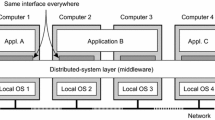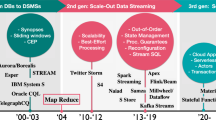Abstract
Many examples illustrate the usefulness of group partitioning in distributed systems. The process group abstraction is a powerful tool for the development of fault-tolerant distributed applications. This solution is also particularly relevant to group entities sharing similar properties or stakes when applied to the field of cooperative work. When dealing with distributed applications, communication standards have evolved from socket-based interfaces to Remote Procedure Calls and nowadays, towards distributed object platforms like CORBA. This standard from the Object Management Group masks distribution and heterogeneity and provides a good basis for distributed application development. This paper presents a review of group mechanisms found in the literature then focuses on the implementation of groups over CORBA. An implementation of such a service over CORBA illustrates the impact of group auto-organization. Performance we obtain show that our service is efficient and provides good mechanisms to manage operations in a group.
Similar content being viewed by others
References
D.A. Agarwal, Totem: A Reliable Ordered Delivery Protocol for Interconnected Local-Aera Networks, PhD Thesis, University of California, Santa Barbara, August 1994.
M. Ahamad, M.H. Ammar and S.Y. Cheung, Multidimensional Voting, ACM Transactions on Computers Systems 9(4) (1991) 399–431.
I. Ahmad and A. Ghafoor: Semi-distributed load balancing for massively parallel multicomputer systems, IEEE Trans. on Soft. Eng., 17 (1991) 987–1004.
G. Alvarez, F. Cristian and S. Mishra, On-demand asynchronous atomic broadcast, in: Proceedings of the 5th IFIP International Conference on Dependable Computing for Critical Applications, Urbana-Champaign, (1995) pp. 68–78.
Y. Amir, D. Breitgand, G.V. Checkler and D. Dolev, Group Communication as an Infrastructure for Distributed System Management The International Workshop on Services in Distributed and Networked Environment (SDNE), Macau, (1996) pp. 84–91.
Y. Amir, D. Dolev, S. Kramer and D. Malki, Membership Algorithms for Multicast Communication Groups 6th Intl. Workshop on Distributed Algorithms proceedings (WDAG), LNCS 647 (1992) pp. 292–312.
Y. Amir et al., The Totem Single-Ring Ordering and Membership Protocol, in ACM Transactions and Computer Systems, 13(4) (1995) 311–342.
Y. Amir and J. Stanton, The Spread Wide Area Group Communication System Technical report CNDS-98-4, The Center of Networking and Distributed Systems, the Johns Hopkins University (1998).
T. Anker, G.V. Chockler, I. Keidar, M. Rozman and J. Wexler, Exploiting Group Communication for Highly Available Video-on-Demand Services The proceedings of the IEEE YUFORIC on Multimedia Information Systems and the 13th International Conference on Advanced Science and Technology (ICAST97) and the 2nd International Conference on Multimedia Information Systems (ICMIS 97), (1997) pp. 265–270.
C. Balayer, C. Daval-frerot and H. Guyennet, The Processor Group Approach to Dynamic Load Balancing in ISMM Parallel and Distributed Computing and Systems, Washington (1995).
P.V. Bengalore, N.E. Doss and A. Skjellum, MPI++: Issues and Features, Mississipi State University, U.S.A. (1994).
I. Beier and H. Koenig, GCSVA—A Multiparty Videoconferencing System with Distributed Group and QoS Management International Conference on Computer and Networks. Lafayette, Louisiana. October 12–15 (1998).
S. Benford and J. Palme, A Standard for OSI Group Communication Computer Networks and ISDN Systems, 25(8) (1993).
B.A. Bensaber and D Seret, Protocoles pour les Communications Multicast, Colloque International sur les Nouvelles Technologies de la Répartition, pp. 303–316 (1997).
E.A. Billard and J.C. Pasquale, Effect of Delayed Communication in Dynamic Group Formation, IEEE Trans. on Systems, Man, and Cybernetics 23(5) (1993).
K.P. Birman and T.A. Joseph, Reliable Communication in the Presence of Failures ACM Transactions on Computer Systems 5(1) (1987) 47–76.
K.P. Birman, R. Cooper and B Gleeson, Programming with Process Groups: Group and Multicast Semantics Papers of the ACM, 37–53, December 1991.
K. Birman, A. Schiper and P. Stephenson, Lightweight Causal and Atomic Group Multicast ACM Transactions on Computer Systems, 9(3) (1991) 272–314.
K.P. Birman and R. van Rennesse, Reliable Distributed Computing using the Isis Toolkit, IEEE Computer Society Press (1994).
K. Birman, R. Friedman and M. Hayden, The Maestro Group Manager: A Structuring Tool for Applications with Multiple Quality of Service Requirements Technical Report 97-1619, Department of Computer Science, Cornell University, Ithaca, NY 14850 (1997).
K.P. Birman, R. Friedman, M. Hayden and I. Rhee, Middleware Support for Distributed Multimedia and Collaborative Computing, in: Multimedia Computing and Networking (MMCN98), 1998.
K.P. Birman, The Process Group Approach to Reliable Distributed Computing Papers of the ACM, 37-53, December 1993.
D. Brattli, A Survey of Dynamic Configurable Protocol Stacks http://www.cs.uit.no/dagb/dynamic-protocols/dynamic-protocols.html, University of Tromso, Faculty of Science, Department of Computer Science, Norway, 1998.
R. Braudes and S. Zabele, Requirements for multicast protocols, Network Working Group, RFC 1458, 1993.
R. Budhia, Performance Engineering of Group Communication Protocols PhD thesis, University of California, 1996.
T.D. Chandra, V. Hadzilacos and S. Toueg, On the Impossibility of Group Membership ACM SIGACT-SIGOPS Symposium on Principles of Distributed Computing (PODC), (1996) pp. 322–330.
G.V. Chockler, N. Huleihel, I. Keidar and D. Dolev, Multimedia Multicast Transport Service for Groupware, in: Proceedings of the TINA Conference on the Convergence of Telecommunications and Distributed Computing Technologies, (1996) pp. 43–54.
F. Cristian, Synchronous and Asynchronous Group Communication Communications of the ACM (CACM), 39(4) (1996) 88–97.
D. Dolev, S. Kramer and D. Malki, The Transis approach to high availability cluster communication, Communications of the ACM, 39(4) (1996).
C. Ellis, S. Gibbs and G. Rein, Groupware. Some Issues and Experiences, Paper of ACM, 34(1) (1991) 35–58.
D.J. Evans and W.U.N. Butt, Load Balancing with Network Partitioning Using Host Groups, Parallel Computing 20 (1994) 325–345.
P.D. Ezhilchelvan, R.A. Macêdo and S.K. Shrivastava, Newtop: A fault tolerant group communication protocol, in: Proceedings of the 15th IEEE International Conference on distributed computer systems, Los Alamitos, CA, USA, (1995) pp. 296–306.
P. Felber, B. Garbinato and R. Guerraoui, The Design of a CORBA Group Communication Service, Symposium on Reliable Distributed Systems 150–159 (1996).
P. Felber, R. Guerraoui and A. Schiper, A CORBA Object Group Service Theory and Practice of Object Systems 4(2) (1998) 93–105.
P. Felber, The CORBA Object Group Service—A Service Approach to Object Groups in CORBA PhD Thesis, Ecole Polytechnique de Lausanne, Swiss (1998).
I. Foster, C. Kesselman and S. Tuecke, The Anatomy of the Grid, Int. Journal Supercomputer Applications 15(3) (2001).
E. Garcia, J-C. Lapayre and G. David, Pilgrim Performance over a New CAliF Communication Layer, in: Proceedings of The IEEE International Conference on Parallel and Distributed Systems, ICPADS'2000, pp. 203–210, Iwate Japan (2000).
A. Geist et al., PVM 3 user's guide and reference manual, Manuel de reference PVM 3, Oak Ridge National Laboratory, May 1993.
K. Guo and L. Rodrigues, Dynamic Light-Weight Groups, in: Proceedings of the 17th International Conference on Distributed Computing Systems (ICDCS '97), Baltimore, Maryland, USA (1997).
H. Guyennet and J-C. Lapayre, A Co-operative Application Management Platform Based on Shared Virtual Memory, IEEE Proceedings of the HiPC'96 International Conference, Trivandrum Inde (1996) pp. 457–462.
H. Guyennet, J-C. Lapayre and M. Trêhel, Distributed Shared Memory Layer for Cooperative Work Applications, IEEE Proceedings of the LCN'97 International Conference, Minneapolis USA (1997) pp. 72–78.
H. Guyennet and M. Trehel, Load Balancing Using Processor Groups, Parallel Processing Letters, World Scientific Publishing Compagny 10(1) (2000) 59–72.
H. Guyennet and J.C. Lapayre, The group approach in cooperative work and in load balancing, Journal of Parallel and Distributed Computing Practices 2(3) (2001) 285–297.
M.F. Kaashoek, A.S. Tanenbaum and K. Verstoep, Group communication in amoeba and its applications Distributed Systems Engineering Journal 1 (1993) 48–58.
R. Khazan, A. Fekete and N. Lynch, Multicast Group Communication as a Base for a Load-Balancing Replicated Data Service International Symposium on Distributed Computing (DISC) (1998) 258–272.
R.A. Macedo, Fault-Tolerant Group Communication Protocols for Asynchronous Systems, Ph.D., University of Newcastle, 1994.
E. Malville, Building Groups Dynamically: A Corba Group Self-Design Service,
S. Mishra, L. Fei, X. Lin and G. Xing, On group communication support in corba, IEEE Transactions on Parallel and Distributed Systems 12(2) (2001) 193–208.
G. Morgan, S.K. Shrivastava, P.D. Ezhilchelvan and M.C. Little, Design and Implementation of a Corba Fault-Tolerant Object Group Service, in: Proceedings of the Second IFIP WG 6.1 International Working Conference on Distributed Applications and Interoperable Systems, DAIS'99, Helsinki (1999).
Moser, P.M Melliar-Smith, D.A Agarwal, R.K. Budhia and C.A Lingley-Papadopoulos, Totem: A fault-Tolerant Multicast Group Communication System Communications of the ACM 39(4) (1996) 54–63.
Nakamura, T. Tachikawa and M. Takizawa, Group Communication Protocols: Properties and evaluation TR, Dept of Computers and Systems Engineering, Denki University, Tokyo, Japan (1992).
Object Management Group, Life Cycle Service Specification Version 1.1 April 2000.
Object Management Group, The Common Object Request Broker: Architecture and Specification—Revision 2.5, September 2001.
Powell, Group Communication Communications of the ACM (CACM) 39(4) (1996) 50–53.
K. Ramamritham, J.A. Stankovic and W. Zhao, Distributed Scheduling of Tasks with Deadlines and Resource Requirements, IEEE Trans. On Comp., (1989) 1110–23.
B. Rajagopalan and P.K. McKinley, A token-based protocol for reliable ordered multicast communication, in: Proceedings of the 8th IEEE Symposium on Reliable Distributed Systems, Seattle, WA (1989) pp. 84–93.
P.G. Raverdy, Gestion de Resources et répartition de Charge dans les Systèmes Hétérogènes à Grande Echelle PhD Thesis, Paris VI (1996).
K. Raymond, Reference Model of ODP, CRC for Distributed Systems Technology, University of Queensland, Australia (1996).
R. van Renesse et al., A framework for protocol composition in horus, in: Proc. of the ACM Symposium on Principles of Distributed Computing (1995).
R. Van Renesse, K. Birman and S. Maffeis, Horus: A flexible group communication system Communications of the ACM 39(4) (1996) 76–83.
L. Rodrigues, H. Fonseca and P. Verissimo, Totally ordered multicast in large-scale systems, in: Proceedings of the 16th International Conference on Distributed Computing Systems, Hong-Kong (1996) pp. 503–510.
E. Rosti et al., Robust partitioning policies of multiprocessor systems Performance Evaluation North Holland 19(2/3) (1994) 141–165.
M. Reiter, K. Birman and L. Gong, Integrating Security in a Group Oriented Distributed System Technical report, Cornell University (1992).
A.S. Tannenbaum, Modern Operating Systems, Prentice-Hall (1992).
J.G. Vaughan, A hierarchical protocol for decentralizing information dissemination in distributed systems, The Computer Journal 38(1) (1995) 57–70.
P. Verissimo, L. Rodrigues and W. Vogels, Group Orientation: A Paradigm for Modern Distributed System, in: Proceedings of the ACM SIGOPS Workshop (1992).
Zhou, Utopia—A Load Sharing Facility for Large, Heterogeneous Distributed Computer Systems Software: Practice and Experience. TR CSRI-257, Toronto (1992).
Author information
Authors and Affiliations
Corresponding author
Additional information
Eric Garcia is Lecturer at the University of Franche-Comté. He received a Ph.D. in computer science in 2001. He is now working on collaborative work and network in the “Distributed Systems and Network” group at the LIFC, the research laboratory for computer science at the university. He is involved in two European research projects (Proteus and Teneci) on telemaintenace and telemedicine aspects, and in a national project dealing with intelligent supervision of critical plants.
Hervé Guyennet is Professor of Computer Science at the University of Franche-Comté. He received a Ph.D. in 1985 and a “Habilitation à diriger des Recherches” in 1994 from the University of Besançon. He is working on distributed systems: load balancing, cooperative work, distributed platform, multimedia, middleware. He is the head of the “Network and Distributed Systems” group at the LIFC, the research laboratory for computer science at the university. He has been the scientific advisor for 9 theses.
Jean-Christophe Lapayre has obtain a Ph.D. Thesis in 1998. After 6 years, he became Professor at the University of Franche-Comté in September 2003. Now he is the head of the computer science teaching department of Besançon, and his research is a part of the Network and Distributed Systems Team of the LIFC. His main research topics are Consistency (in shared memory, and in shared work), concurrency protocols (distributed algorithms, validation) and adaptability (on terminal, on network). Applications of these research works are implemented in many projects: Proteus, Teneci and Temic.
Rights and permissions
About this article
Cite this article
Garcia, E., Guyennet, H. & Lapayre, JC. Groups Partitioning Over CORBA for Cooperative Work. Cluster Comput 9, 67–78 (2006). https://doi.org/10.1007/s10586-006-4898-8
Issue Date:
DOI: https://doi.org/10.1007/s10586-006-4898-8




